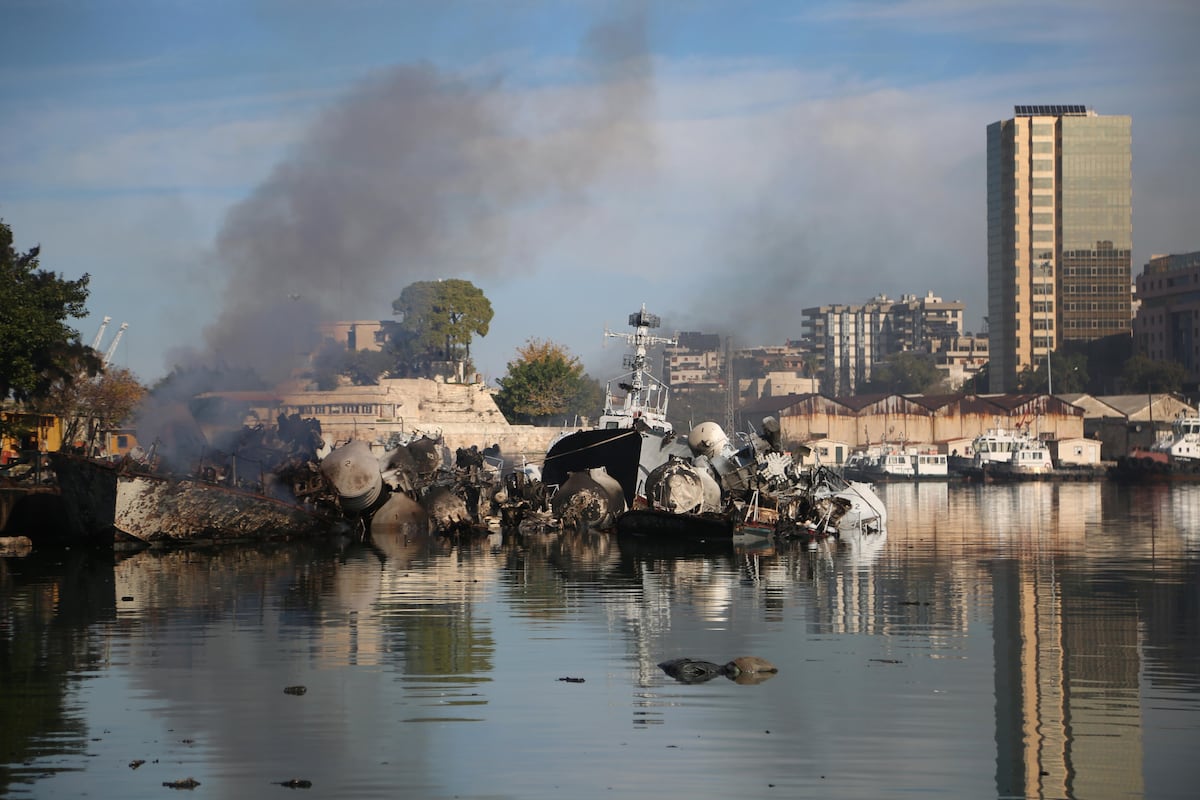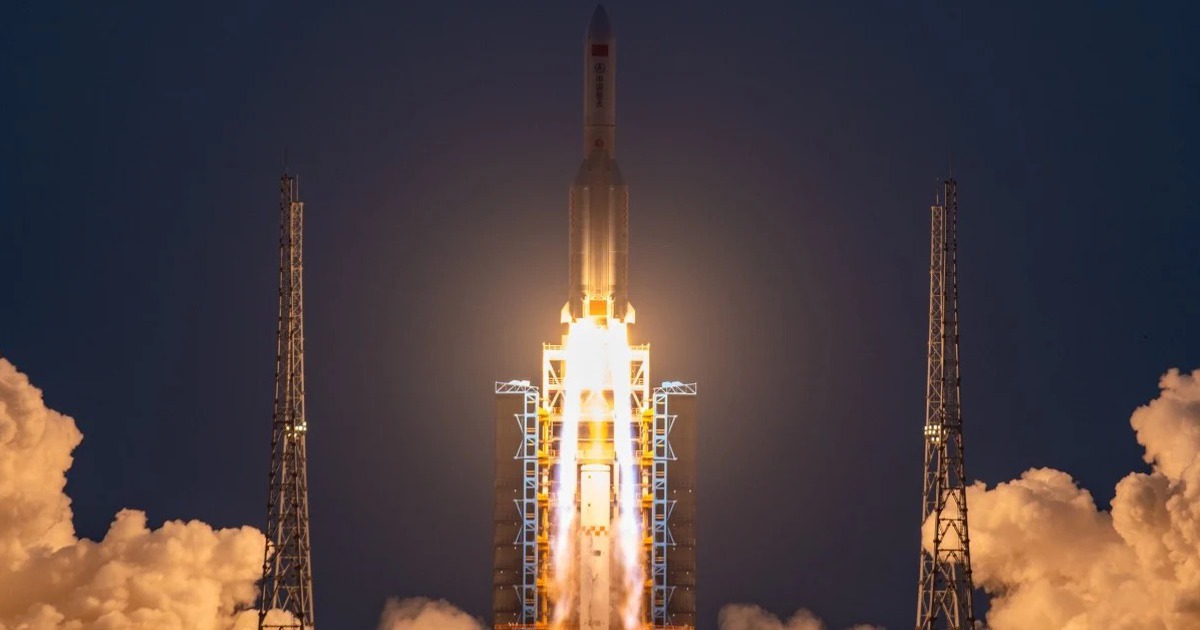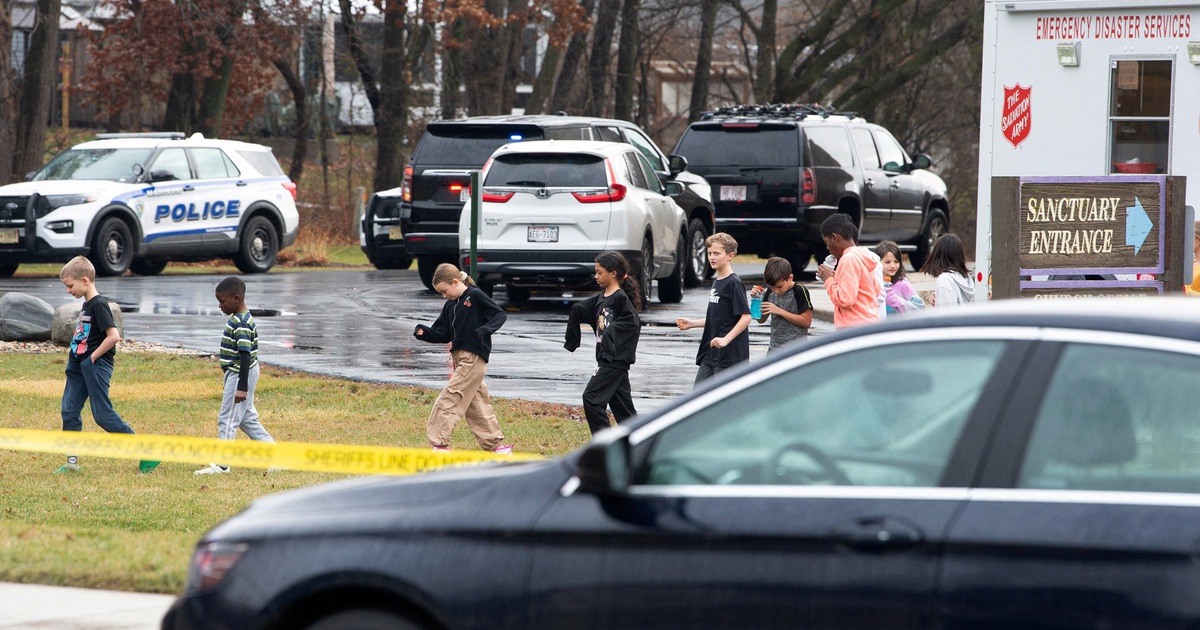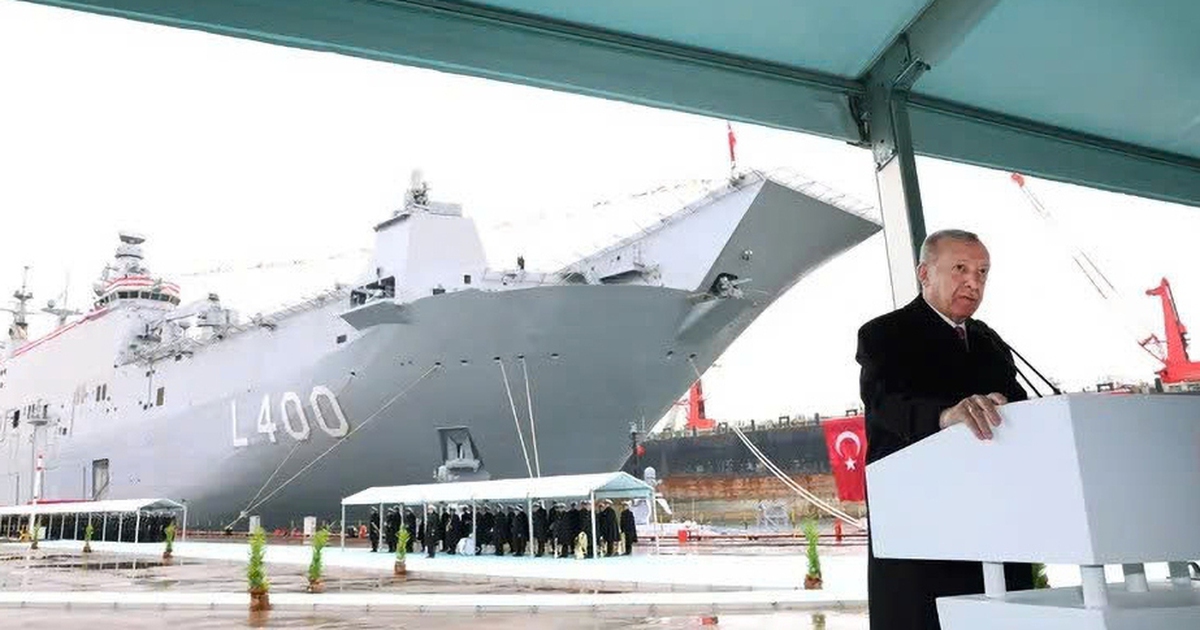Ahmed smokes with a trembling hand and moves his foot nervously. He is 27 years old and has just arrived from Hurriye, one of the towns in the demilitarized zone of Syria that the Israeli army has rushed to penetrate for the first time in the last half century, taking advantage of the confusion after the fall of the dictator on Sunday. Bashar Assad. An hour earlier, he explains, the notable of his town had communicated to the neighbors through the mosque’s loudspeakers the order he had just received from the Israeli army: they had one hour to leave.
“I was working, so I took my wife and children and came with the same clothes,” he says, while pointing to his mud-stained katiuskas. He is a rancher and his mind is more on his cows and sheep, which he has left behind without knowing who will feed them, than on future plans. “What was I going to do? Stay? It’s what there was. I have no plan… today we will sleep here.” When he says “here” he refers to the nearby village of Shahda, where Israeli troops have not arrived, but you can see a few hundred meters away – in a straight line on the same road – a tank that worries both young and old. because no one knows what it will do in the coming days: advance, stay or retreat.
The current one in Syria is Israel’s third invasion since October 2023, after Gaza and Lebanon, accompanied by unprecedented naval and air bombardments (350 in just 72 hours) that have been ignored by the holding of the Syrian rebel offensive that ended 13 years of civil war.
“The Israelis have spoiled our joy over Assad’s departure. All Syria celebrates except us. For me they are the same,” says the elderly Ibrahim Yarida. Yawal Awuad, 49, agrees: “They haven’t even left us five hours to celebrate that Assad is gone. We got rid of one problem and woke up with another. “Now we are worried that they will come in here too.” The locals have placed three garbage containers in the middle of the road so that no one goes ahead and runs into the tanks.
They tell it in a car repair shop, around a diesel stove on which they heat a can of sunflower oil filled with water. It is the way to be able to wash your face and hands with hot water afterwards, in a poor countryside in a country where 90% of the population is already poor, according to UN data. Between village and village, you only see flat, rocky land without crops and, from time to time, a shanty.
Israel has basically rushed to take advantage of the power vacuum to ensure that there is nothing left for anyone to one day attack Israel, accompanying the ground advance with an intense wave of bombing. This Tuesday, the Israeli Armed Forces announced that they had destroyed “most of the strategic weapons warehouses in Syria in 48 hours, preventing them from falling into the hands of terrorist elements.” It is, as the military correspondent for Israeli television channel 12, Nir Dvori, pointed out this Monday, an operation “designed to ensure that whoever ends up taking the reins of Syria takes a long time to rebuild the country’s military capabilities.” “Whoever follows in Assad’s footsteps will end up like him,” Defense Minister Israel Katz has warned.
Never in half a century, since the Yom Kippur War in 1973, had Israel settled on Syrian soil, despite the frequent violations on both sides during the civil war, which were allowed to pass because they were linked to the fighting. Entering Syrian territory is expressly prohibited by the armistice, which – like all agreements between States – has a validity that transcends the Government in power. Prime Minister Benjamin Netanyahu, however, considers him dead with the defenestration of Assad. “If the new regime in Syria allows Iran to reestablish itself or allows the transfer of Iranian weapons to Hezbollah, we will respond with force and demand a high price,” declared the Israeli prime minister.
The Assad regime was hostile and allowed (by will or weakness) the passage of weapons from Iran to Lebanon for Hezbollah, but was limited to diplomatic complaints about the countless Israeli air bombings in Syria (with the green light from Russia) against targets. linked to Tehran. And, above all, it was predictable, unlike the horizon that the country is drawing these days after the offensive led by Islamic fundamentalists of Hayat Tahrir El Sham.
Nobody says it, but a doubt seems to float in the air among those who welcome Ahmed, as always here, with a cup of coffee: Will he set foot in his house again? Everyone feared what Israel officially announced a few hours later: it intends to establish a “sterile zone” that is preparing for a prolonged presence.
Israeli troops are in Shahidiye. One of the neighbors, Abu Ali, says by phone that the military has asked all the neighbors to remain calm, but not to leave the house under any circumstances. “How not to do it? The electricity comes on for about 15 minutes and then goes off. There is no water. They have brought some food through the United Nations,” he protests.
Shahda’s neighbors are uncomfortable with their new reality. Not so much the nearby presence of the tank or the occasional sound of gunfire as the constant drone overhead of Israeli drones. Abu Uyud says that “they were once heard” since October 2023, when Hamas attacked Israel and pro-Iran militias in Syria opened a front with occasional attacks. “Or they would come, take images and leave. Now it’s like this all the time. “It drives me crazy,” he adds.
Great military operation
Israeli forces have destroyed, among others, 15 Syrian army ships in the ports of Al Bayda and Latakia and dozens of air-to-air missiles with ranges of up to 190 kilometers, according to the military statement. It has been one of the largest operations in the history of the country’s Air Force. The fighters, he adds, have flown over Syrian airspace for “hundreds of hours”, during which they can be heard passing by, their contrails are seen or their bombing is heard, particularly in the early hours of Tuesday.
The troops have penetrated about 25 kilometers (according to locals) into the demilitarized zone, marked in a UN resolution in 1974, almost a year after the Yom Kippur war, to delimit where there can be no more military presence or heavy weapons than the around 1,200 blue helmets that guard it. They are 80 kilometers long, between the border with Lebanon (where it reaches 10 kilometers wide) and that of Jordan, where it narrows a lot and is reduced to just 500 meters. It is delimited by two lines. To the west, Alfa, on the border with the Golan Heights (territory that Israel occupied in the 1967 Six-Day War and later annexed). To the east, Bravo, already inside Syria.
It is guarded by UNDOF, a small, little-known United Nations peacekeeping force. Now it also has an uncertain future. The danger has made several countries withdraw and now it only has more than 1,100 soldiers and 100 civilians from 13 countries. It is, for example, a tenth of Unifil, which monitors neighboring southern Lebanon, from where Israel must withdraw its troops in the next month and a half, under the ceasefire agreement.
But between Alfa and Bravo there are Israeli soldiers and heavy weapons. The UN has protested, so Sheikh Chaher took the car this Monday and went to speak with a representative of the UN mission. He takes out his cell phone and shows a video of the conversation. “I told him: Iran is gone, Hezbollah is gone. Why do Israelis open fire on people? ‘Because they fear that Hezbollah is there,’ he replied.’ If he is no longer in Syria. If anyone in the town shoots here now it is in the air, out of joy that Assad is gone.”
As he was not happy, and the army penetrated more and more villages and began to order forced displacements, he ignored the danger and tried to approach the Israeli position to speak directly with the military. He relates that the commander, surprised, simply told him “Ok, ok, yes, we also want peace.”
The Israeli narrative on the ground invasion has changed in just three days. First, the army issued a statement saying its troops were helping the blue helmets repel an attack that the UN mission did not confirm in its statement. A day later, it reported its penetration into Syrian territory, the first in half a century, without exceeding the demilitarized zone. Netanyahu issued two statements defending him. In English, he called it a “temporary” measure. In Hebrew, I don’t use the word.
Syrian transitional executive appoints Mohamed el Bashir as interim prime minister
The new Syrian transitional government has appointed Mohamed el Bashir as interim prime minister to lead a process that should conclude on March 1, 2025, as he himself announced this Tuesday in a press appearance. Since January, El Bashir held the same position in the so-called National Salvation Government, the parallel government of the Hayat Tahrir al Sham organization, which led the offensive against the overthrown Syrian regime, in its fiefdom of Idlib, in northwest Syria.
Originally from that same province, where he was born in 1983, El Bashir is an electronic engineer. He made the leap into politics after the popular revolts of 2011 against Assad, harshly repressed by the regime. The new interim prime minister has defined his Executive as “a government of salvation”, made up of an undetermined number of ministers, whose identity will be known later, as he stated.










